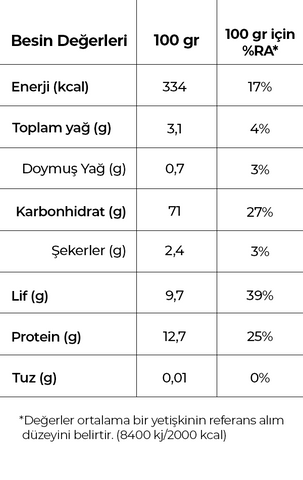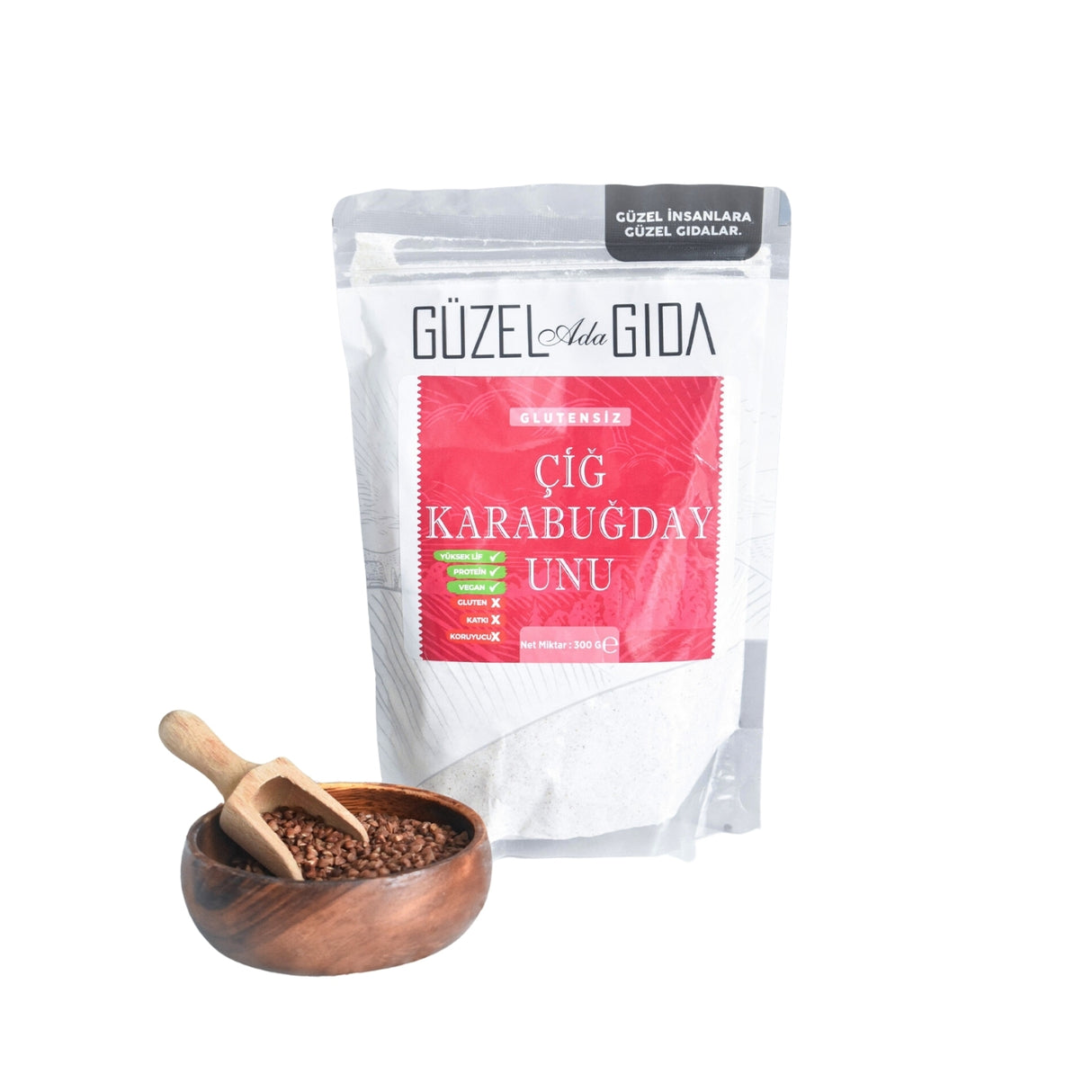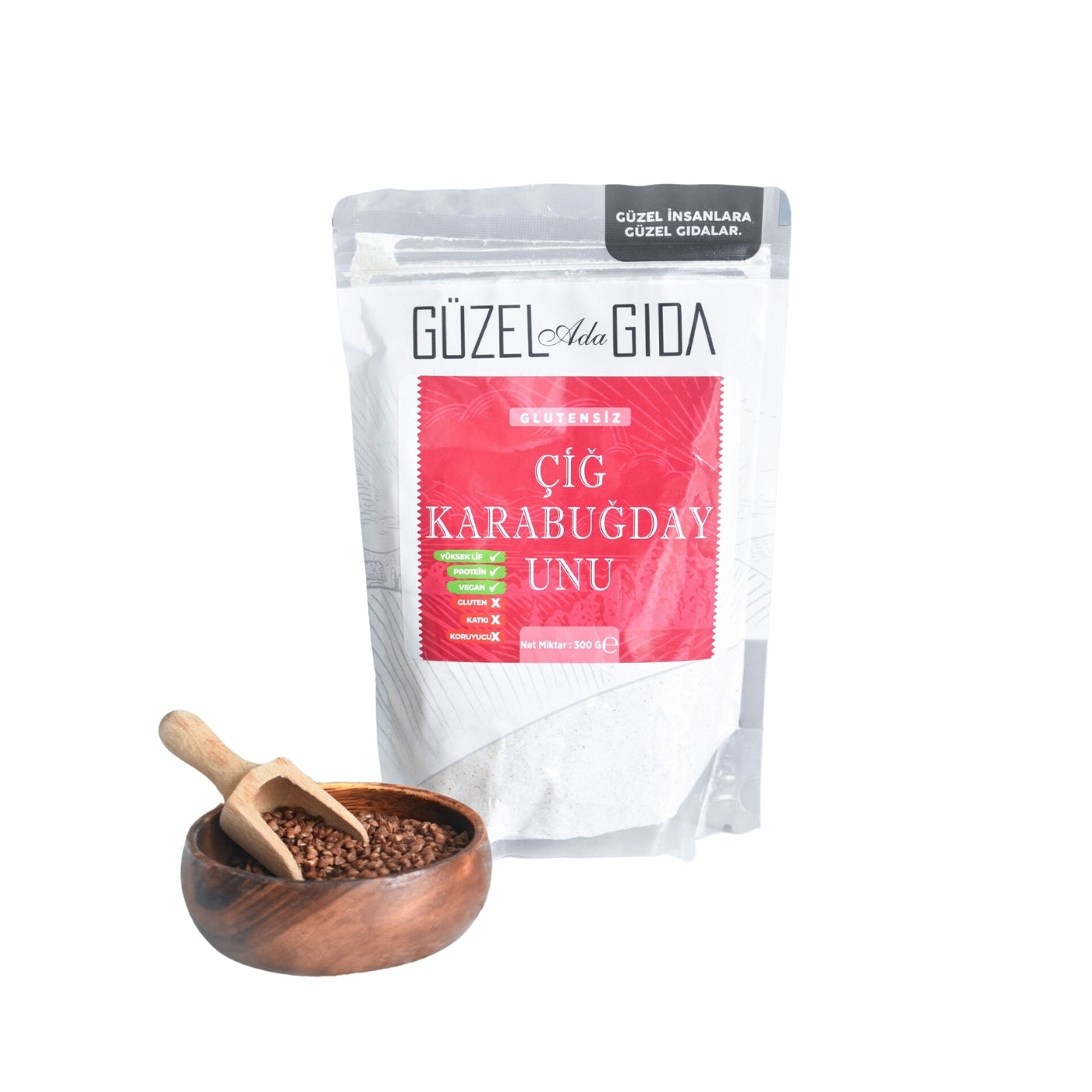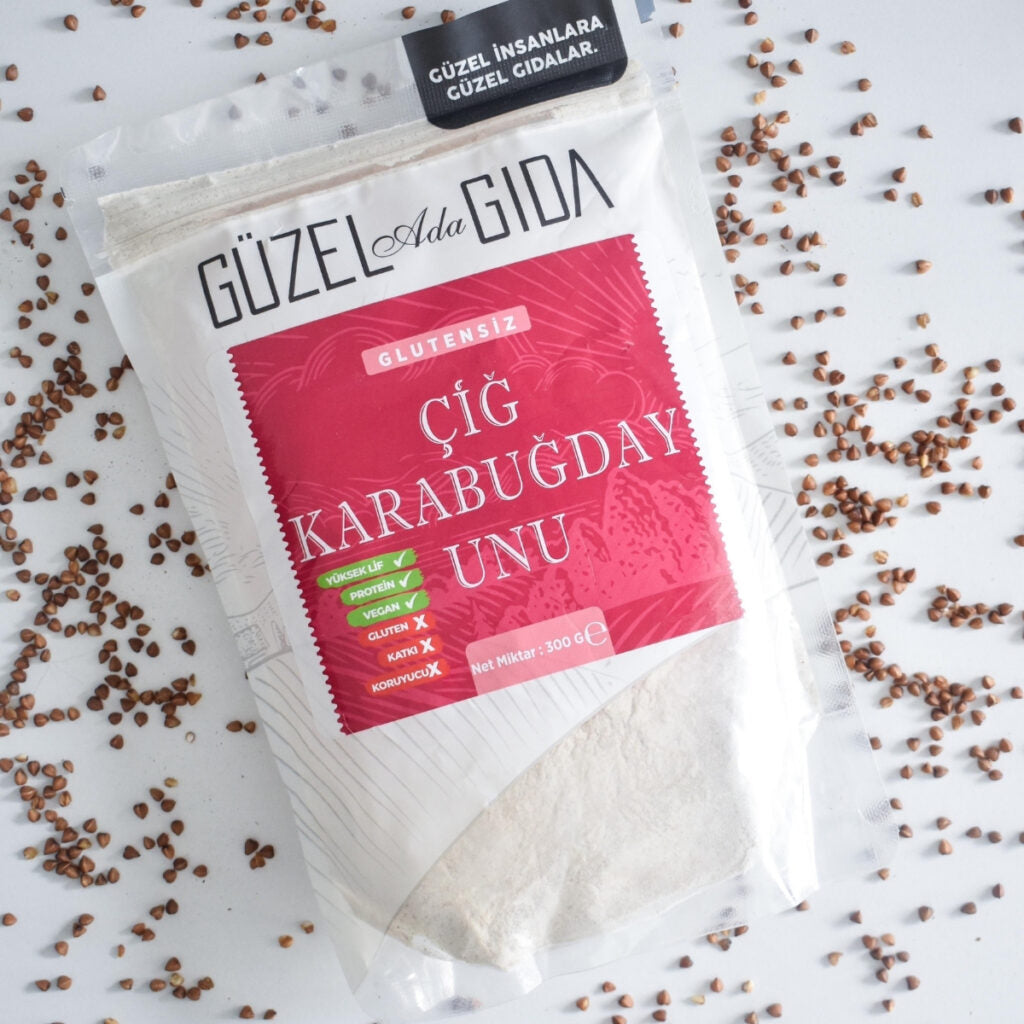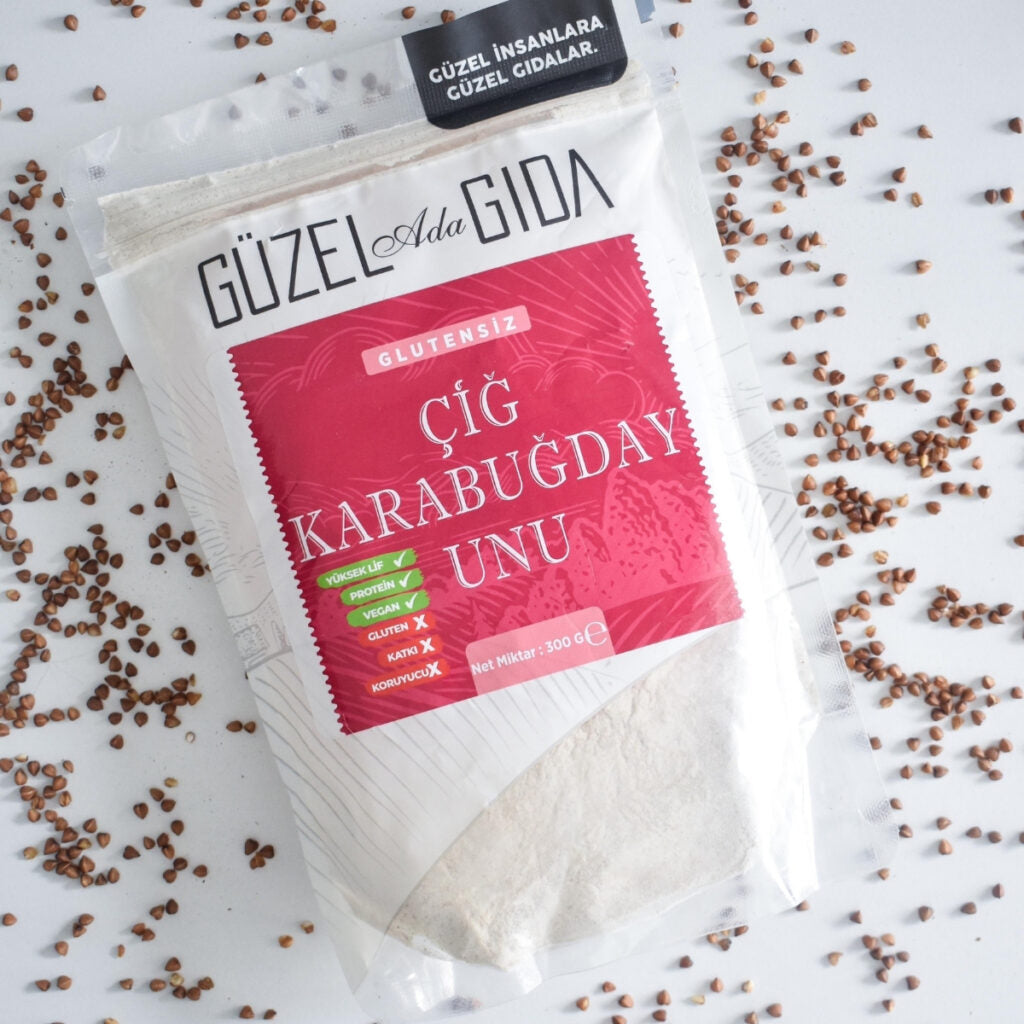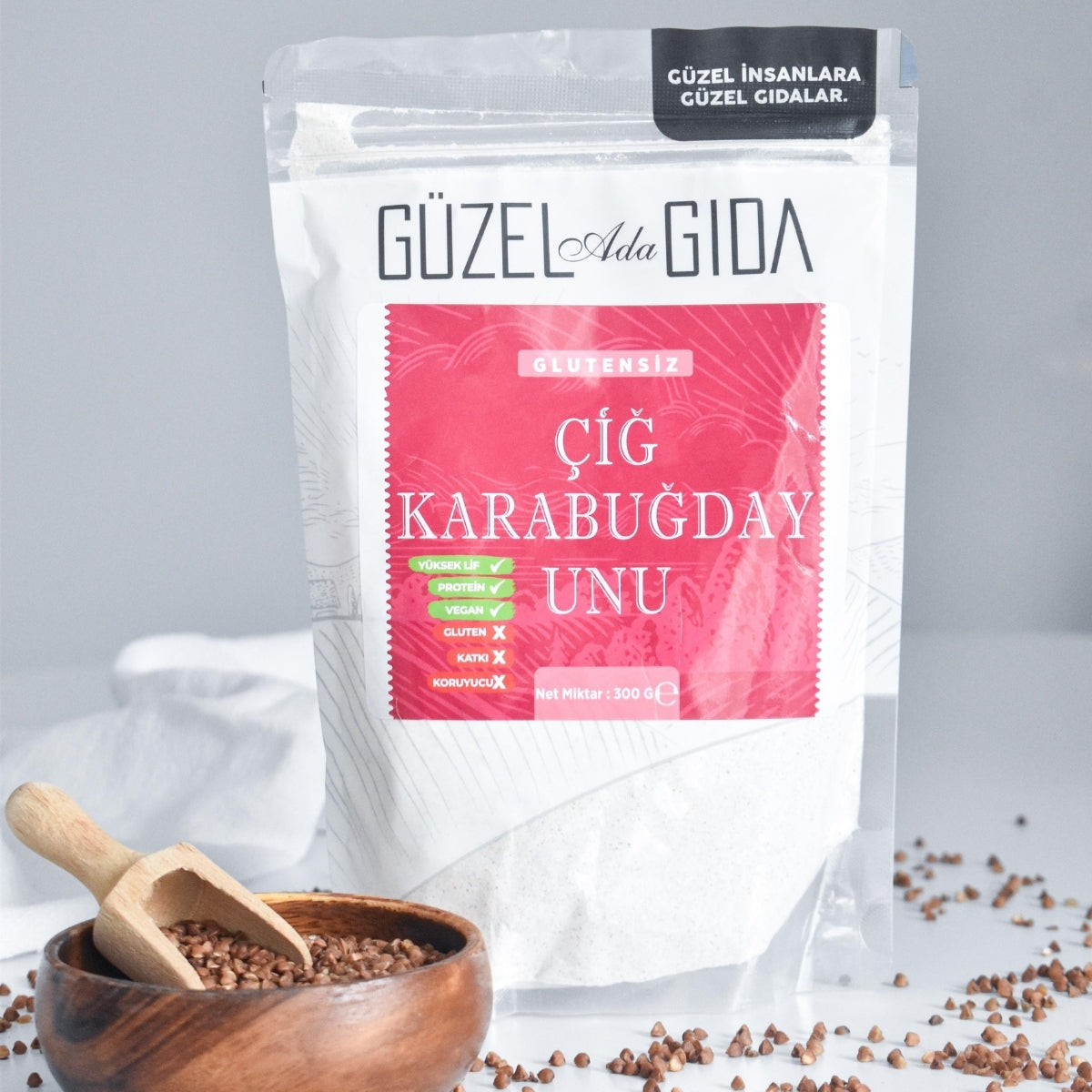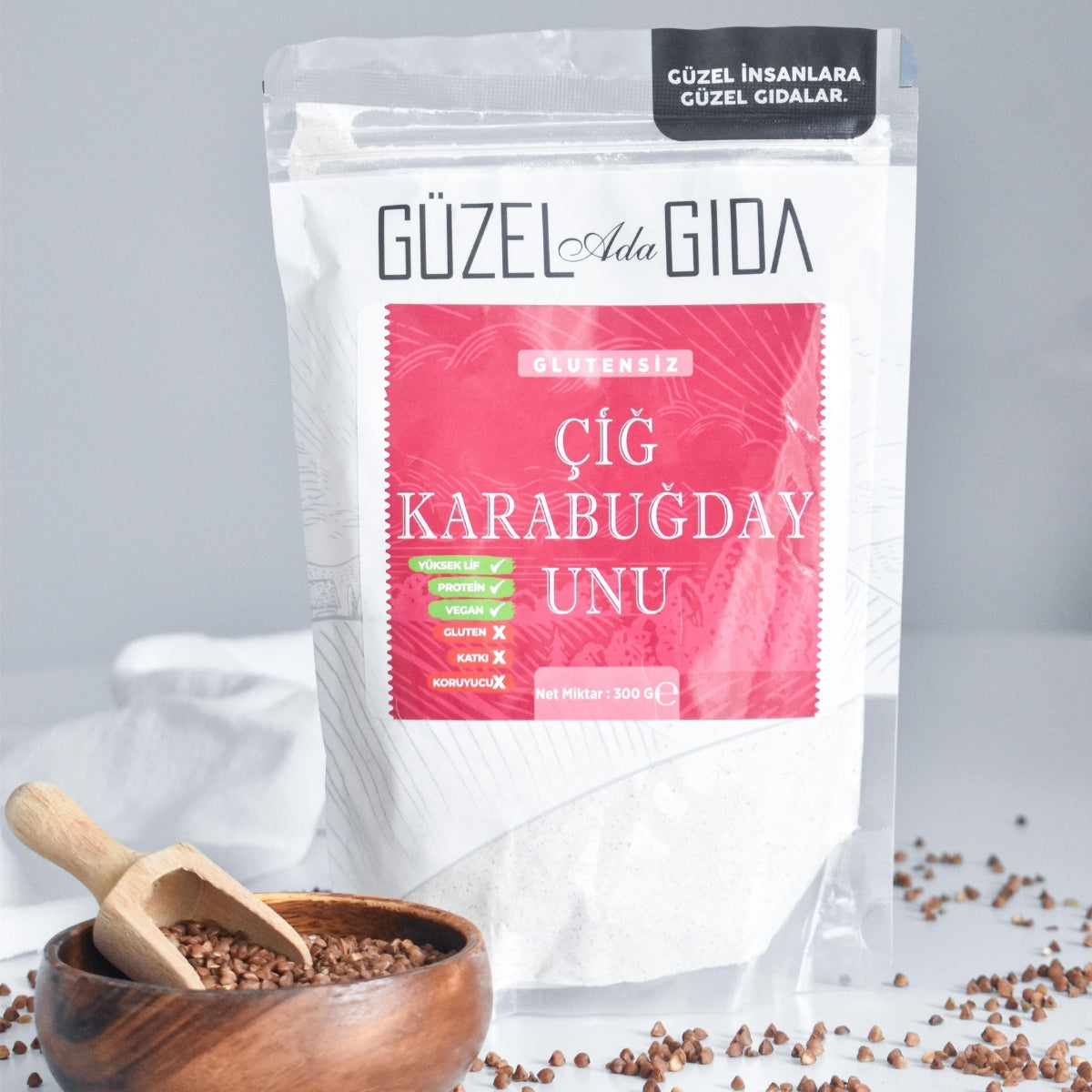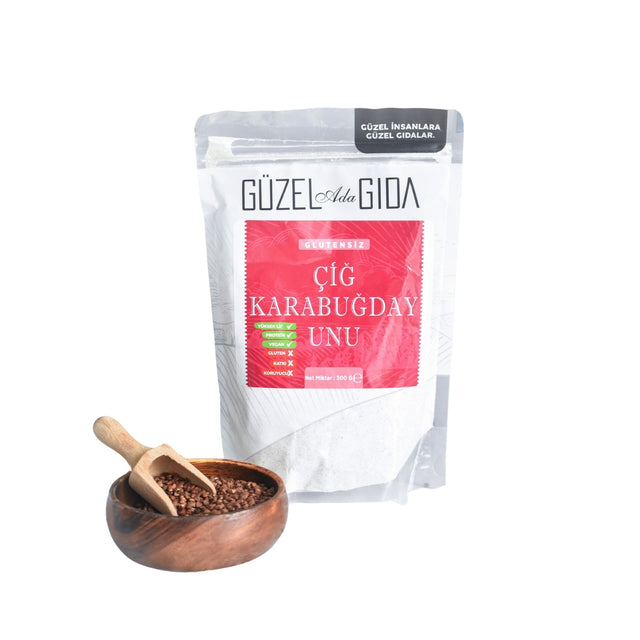Raw Buckwheat Flour 300G
Raw Buckwheat Flour 300G is backordered and will ship as soon as it is back in stock.
Couldn't load pickup availability
Description
Description
What is buckwheat?
Buckwheat is a plant belonging to the Polygonaceae family and whose Latin name is Fagopyrum esculentum. Although its name includes the word "wheat", it is actually a non-cereal plant and is not biologically related to wheat. The most striking features of buckwheat:
Nutritional Values:
Buckwheat contains high amounts of protein, fiber, vitamins and minerals. It is especially rich in B vitamins, magnesium, iron and zinc. It is rich in amino acid profile, especially containing essential amino acids that the body cannot produce.
Gluten Free:
Buckwheat does not contain gluten, so it can be consumed easily by celiac patients and people with gluten intolerance.
Why Güzel Ada Gıda Raw Buckwheat Flour?
Our Raw Buckwheat Flour, which is among our products, is a local product that does not contain additives or gluten contamination risk. Our locally produced Raw Buckwheat flour is made only from buckwheat grown in our fertile lands. Roasted buckwheat has its own bitter and dominant smell, but the difference of raw buckwheat flour is that its smell is soft and very different. At the same time, our product, which is obtained from a raw seed and whose nutritional values reflect very good results in dough recipes, is a flour that is relatively easier to use than other gluten-free flours.
How is Raw Buckwheat Flour 300g Produced?
Our Raw Buckwheat Flour, which is very practical to use, is made from carefully selected and unroasted buckwheat grains, first passed through sortex machines and sorted to remove weak grains, then our products, which are peeled and sterilized, are ground in our gluten-free mills and come to your table in reliable packages.
Buckwheat Usage Areas:
Buckwheat can be turned into flour and used in bread, pancakes, pasta and various baked goods.
Its seeds can be used in dishes such as rice, salad and soup.
What is Raw Buckwheat Flour?
Raw buckwheat flour is a type of flour obtained by grinding unprocessed and uncooked buckwheat grains. The fact that buckwheat flour is not roasted makes it easier for the dough to leaven.
Why Use Raw Buckwheat Flour?
- Gluten-free: Raw buckwheat flour does not contain gluten and can be safely consumed by celiac patients and those with gluten intolerance.
- Nutritional Value: Raw buckwheat flour contains high amounts of protein, fiber, vitamins (especially B vitamins) and minerals (magnesium, iron, zinc). It is also rich in essential amino acids.
- Low Glycemic Index: This flour can help keep blood sugar balanced as it has a low glycemic index.
- Antioxidant: Its high antioxidant content can strengthen the immune system by protecting the body against free radicals.
What are the areas of use?
Bakery Products: Raw buckwheat flour can be used in bread, pancakes, cookies, cakes and similar baked goods. Since it does not contain gluten, it may differ structurally from wheat flour and therefore may need to be mixed with other flours in some recipes.
Smoothies and Shakes: It can be added to smoothies and shakes to increase nutritional value.
Pastries: It can be used in pizza dough, pies and similar pastries.
Raw Recipes: It can be used in raw recipes, especially by vegans and those who adopt a raw diet, without losing its nutritional value.
What are the benefits of raw buckwheat flour?
Digestive system: Its high fiber content supports digestion and helps maintain intestinal health.
Heart Health: It may help regulate cholesterol levels and support cardiovascular health.
Blood Sugar Control: Having a low glycemic index can help keep blood sugar levels under control.
Raw Buckwheat Flour is a type of flour that is both nutritious and suitable for versatile use. It is an ideal alternative especially for people with healthy nutrition and special dietary requirements. It is widely used especially in gluten-free diets and nutrition programs where plant protein sources are desired to be increased.
What is the Nutritional Value of Raw Buckwheat Flour?
The nutritional value of raw buckwheat flour is particularly notable for its high protein, fiber, vitamin and mineral content.
Vitamins:
Vitamin B1 (Thiamine): 0.1 mg (approximately 7% of daily requirement)
Vitamin B2 (Riboflavin): 0.4 mg (approximately 24% of daily requirement)
Vitamin B3 (Niacin): 7 mg (approximately 35% of daily requirement)
Vitamin B6: 0.4 mg (approximately 20% of daily requirement)
Folate: 30 mcg (about 8% of your daily needs)
Minerals:
Iron: 4 mg (about 22% of your daily needs)
Magnesium: 231 mg (about 58% of your daily needs)
Phosphorus: 347 mg (about 35% of daily requirement)
Potassium: 577 mg (about 16% of your daily needs)
Zinc: 2.4 mg (about 16% of daily requirement)
Copper: 0.6 mg (about 31% of daily requirement)
Manganese: 1.3 mg (about 65% of daily requirement)
Sodium: 1 mg (very low)
How to Store Raw Buckwheat Flour?
Correct storage conditions are important to preserve the nutritional value and freshness of raw buckwheat flour.
Some Tips for Storing Raw Buckwheat Flour
A Cool and Dry Place:
Store Raw Buckwheat Flour in a cool, dry place. Moisture can cause the flour to spoil and mold, so a dark, dry place like a kitchen cupboard is ideal.
Airtight Containers:
To preserve flour’s freshness, store it in airtight containers. Exposure to air can cause flour to oxidize, decreasing its nutritional value. Glass jars, plastic storage containers or tightly sealable bags are suitable for this purpose.
Refrigerator and Freezer:
Raw Buckwheat Flour can be stored in the refrigerator or freezer if it is to be stored for a long time. The storage period in the refrigerator can be approximately 6 months, and in the freezer can be 1 year. Storing in airtight containers or freezer bags prevents the flour from absorbing moisture and odors.
Avoid Direct Sunlight:
Make sure that the flour is not exposed to direct sunlight. Sunlight can cause the flour to spoil and lose its nutritional value.
Storage Period:
Short-term Storage: Can be stored for 1-3 months in an airtight container in a cool, dry place.
Long-term Storage: Can be stored in the refrigerator for up to 6 months and in the freezer for up to 1 year.
Odor Control:
Check the smell of the flour periodically to make sure it is still fresh. If you notice an unpleasant smell, avoid using it as it may have gone bad.
Labeling:
Label the flour container with the date to keep track of how long it has been stored. This way, you can easily track when it was stored and when it should be used.
These storage methods will help you preserve the nutritional value and freshness of raw buckwheat flour for a long time.
Contents
Contents
